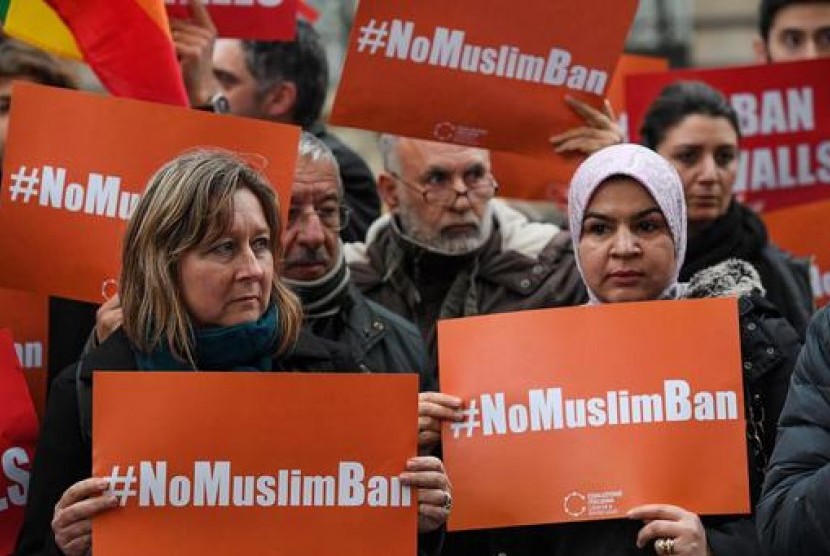By : Ahmad S *)
REPUBLIKA.CO.ID, Publics of the world have been shocked by President Donald Trump's order to restrict people from seven Muslim-majority countries from entering the United States. The new U.S. president signed an executive order on Friday/January 27, 2017 that will curb immigration and the entry of refugees from Iraq, Syria, Iran, Sudan, Libya, Somalia or Yemen from entering the United States for 90 days. He also separately said that he wanted the U.S. to give priority to Syrian Christians fleeing the civil war there.
This controversial decision has sparked confusion and anger after immigrants and refugees were kept off flights and left stranded in some airports in the country. Politicians, rights groups and activists have criticized Trump's maneuver and called to fight the order.
With authority he has and supported by the country’s immigration laws,Donald Trump has claimed enermous power to determine who and how many immigrants to allow into the United States. The executive order has also been applied to those who are the holder of permanent residence permits, known as green cards in the country.
Leading political and business figures then moved quickly to condemn the ban. German Chancellor Angela Merkel voiced her disapproval, calling Trump's move as "unjustified" by security concerns. British Prime Minister, Theresa May, through her spokesman said do not agree with this kind of approach. If there is any impact on UK nationals, then clearly UK will make representations to the US government about that."
Although US federal appeals court refused to reinstate President Donald Trump's executive order temporarily banning immigrants from seven mostly Muslim countries late, but Trump will likely to fight back.
Anti-Islam Sentiment in US
Throughout 2016, there has been a spate of horrific Islamophobic attacks on Muslims in the U.S. A Muslim doctor for example was stabbed and then shot twice while heading to the mosque for Fajr (dawning) prayers in the US city of Houston, Texas, on the 3rd of July, as reported by Al Jazeera and other media. A day before on Saturday 2nd July, a Muslim man was severely beaten outside the Fort Pierce Islamic Centre in Florida. The attacker approached shouting racial slurs, including “You Muslims need to get back to your country” before assaulting the victim, according to the Council on American Islamic Relations (CAIR).
Then on the two consecutive days on the 30th dan 29thof June, two Muslim men were shot while walking to a mosque for Taraweh prayers in Minnesota aand a Muslim businessman from the United Arab Emirates who was visiting the U.S. for medical treatment was wrestled to the ground, handcuffed and arrested by police in a hotel in Ohio after being accused by a hotel staff member of having pledged allegiance to ISIS while speaking Arabic on the phone, which is happen on. The man sustained several injuries during the incident. Later, the hotel employee admitted that she had lied because she was scared of the man as he was wearing a thobe.
Potential Implication
An anlysis saying that Trump’s immigration ban is “the perfect ISIS recruiting tool.” The policy will makesome Muslims who were thus far peaceful and moderate will be so enraged that they will take up arms against American citizens. This move taken by Trump might be perfectrly described in one of the famous quote “Sometimes government actions result in making the problem they are trying to fix worse rather than solving it...”
Its also discussed by some economics and educational experts that the policy is bad for American universities, it's bad for the American economy, because a lot of these people who are here already or who would come here would fill schools and would work for the major technology and other firms in the country.
Then what lesson Indonesia can take from the U.S. new president Donald Trump move?Well, simply do not generalise things, for example that even the necessary determined fight against terrorism does not justify placing people of a certain background or a certain faith under general suspicion. The government should protect all groups, represent whole communities, and uphold social justice, as stated in the fifth principle of Pancasila “Social Justice for all of the people of Indonesia”. The philosphy is not merely referring to an equal distribution of welfare, but also the protection of the weak.
*) writer is a researcher at Menara Institute, resides in Jakarta.


